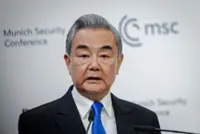BEIJING has set out to extend its domestic laws across international borders with a ban on selling some goods to the US that applies to companies both inside and outside China.
The first use of new export control rules attempts to replicate the extraterritorial reach of US and European sanctions by covering Chinese products or goods with Chinese parts in them. In an announcement this week, China declared it’s banning both the sale of dual-use items to the American military and also the export to the US of materials such as gallium and germanium.
Companies and people overseas will be subject to those restrictions, the Ministry of Commerce said Tuesday. “Any organisation or individual from any country or region that violates the above provisions and transfers or provides relevant dual-use items originating in the People’s Republic of China to organisations or individuals in the United States will be held accountable according to law.”
The decision marks the first time China is employing new controls that extend to products with both civilian and military uses. The rules went into effect on Sunday and allow for application similar to the US Export Administration Regulations, according to a report from the law firm Covington & Burling, which noted that there are “few details” on when this extraterritoriality would be invoked.
The precedent-setting move amounts to an escalation with the US weeks before President-elect Donald Trump takes office. China is the top global supplier of dozens of critical minerals, and concerns about its dominance have been mounting in Washington since Beijing placed initial controls on exports of gallium and germanium last year.
“I’m not aware of another such case under the current regulatory regime,” said Cory Combs, an associate director at research firm Trivium China. “For companies, the extraterritorial application means they shouldn’t bank on any loopholes to keep supplies flowing. Simply put, companies using the affected inputs need to find alternative supplies ASAP.”
The new provisions build on language in the 2020 export control legislation, which also said that the law applied to individuals or organisations inside or outside of China, according to Combs.
In recent years the Chinese government has been strengthening its toolbox to push back against US sanctions and trade controls, creating the “Unreliable Entity List” and “Export Control Law” in 2020 and the “Anti-Foreign Sanctions Law” in 2021. It also passed a National Security Law for Hong Kong which claimed jurisdiction over acts committed outside China’s territories.
But while the new formulations in the rules are concerning, “we don’t yet have a clear consensus view on how far Beijing might go to investigate or punish third countries suspected of prohibited re-exports,” Combs said.
In response to US criticism of China’s curbs on exports of gallium and other materials, Ministry of Commerce spokesman He Yadong defended his nation’s actions, saying it was the “US which has abused export control measures” and accusing the US of “economic coercion that seriously harmed international supply chain stability.”
“China’s move is in line with domestic law and is aimed at safeguarding the country’s security and interests,” he said this week.
Exports of gallium and germanium to the US had already dropped off to zero this year, Chinese customs data shows. — Bloomberg





